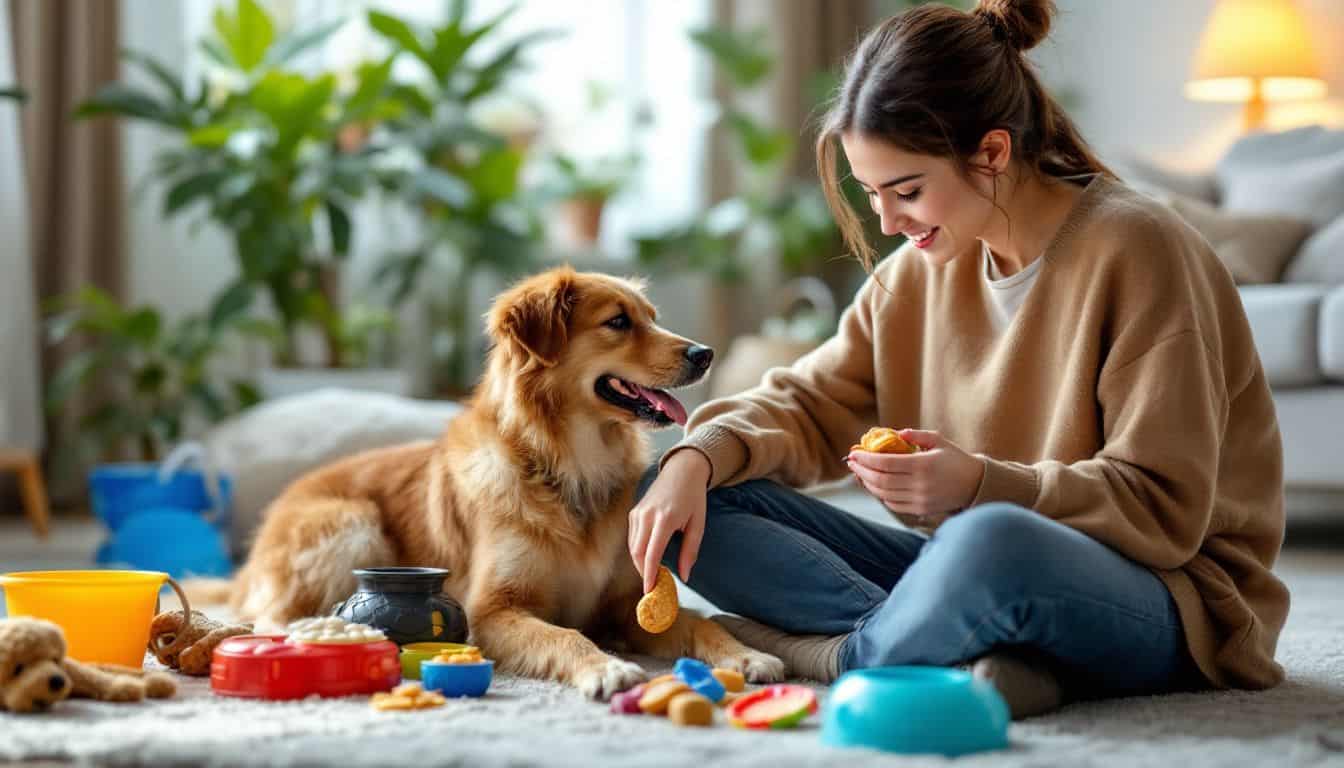Is your dog chewing and swallowing strange items around the house? Foreign objects can cause serious harm, like choking or intestinal blockage. We will show you how to stop dogs from eating foreign objects—with 5 smart fixes that work every time.
Keep reading to protect your furry friend’s health!
Key Takeaways
Dogs often swallow dangerous items out of curiosity, stress, or if they’re missing key nutrients—leading to choking, stomach blockages, or poisoning.
Keep risky objects safely stored away, and offer plenty of safe chew toys to fight off boredom and discourage destructive habits.
Teach simple commands like “leave it” or “drop it”, so you can quickly stop your dog from eating something dangerous.
Spraying items with pet-safe bitter sprays can help deter chewing by creating unpleasant taste associations.
If your dog vomits, won’t eat, or seems uncomfortable after possibly eating something risky, get veterinary care right away.
Table of Contents
Why Do Dogs Eat Foreign Objects?
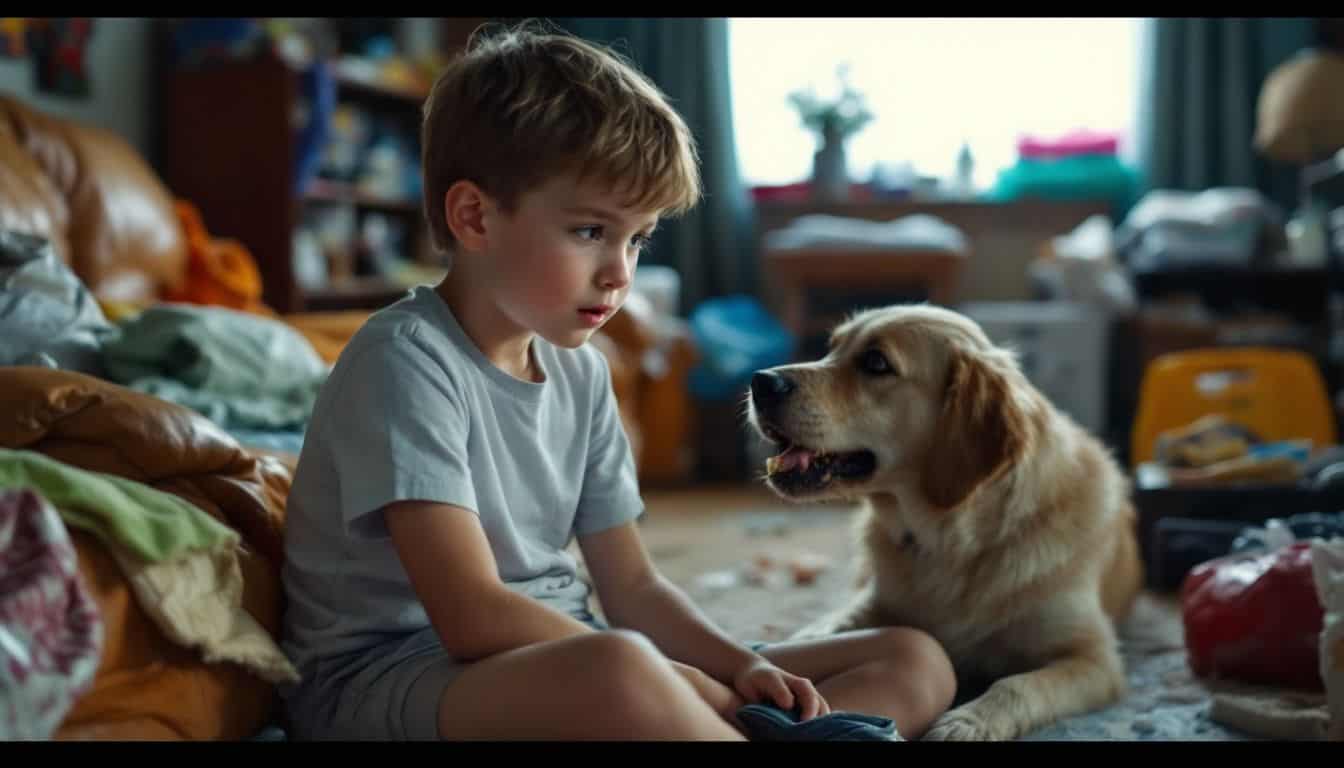
Dogs often eat weird stuff for reasons beyond just hunger. Your furry friend might munch on socks or rocks due to boredom, stress, or even a lack of certain nutrients in their diet.
Curiosity and exploration
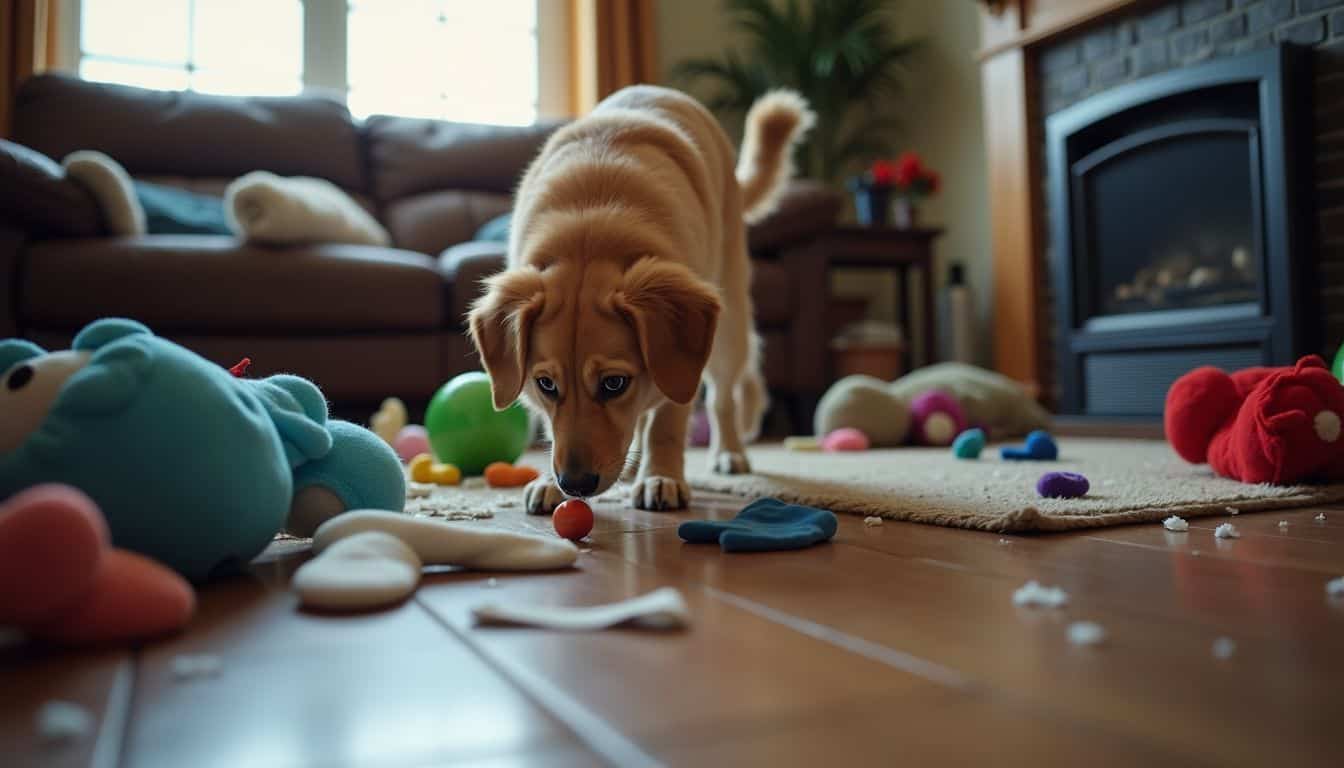
Your dog explores the environment mainly through sniffing, licking, and chewing. Just like human babies, dogs rely on their mouths to discover new objects. My dog Max often sniffs an unfamiliar item, gives it a quick lick, and then chews to learn what it’s about.
Through this process, dogs figure out their surroundings—and it’s perfectly natural.
Yet during play sessions, meals, grooming, or just wandering around, pups may grab items they really shouldn’t. They tend to reach for socks, toys, or garbage because these things either smell interesting—or maybe have leftover food scents.
Boredom often makes this behavior worse. My neighbor’s Labrador once swallowed a TV remote after being left alone too long. Most dogs thrive on mental stimulation and interesting playtime.
If they don’t get enough toys, attention, or activities, they might chew on unsafe objects for entertainment. Swallowing these items might cause real health dangers, like choking or intestinal blockage.
At the very first sign your dog swallowed something dangerous, contact your vet immediately. Good pet insurance policies that cover up to £15,000 in vet fees related to unexpected accidents and illnesses. can prevent costly bills if your pup needs emergency surgery.
Behavioral issues or anxiety
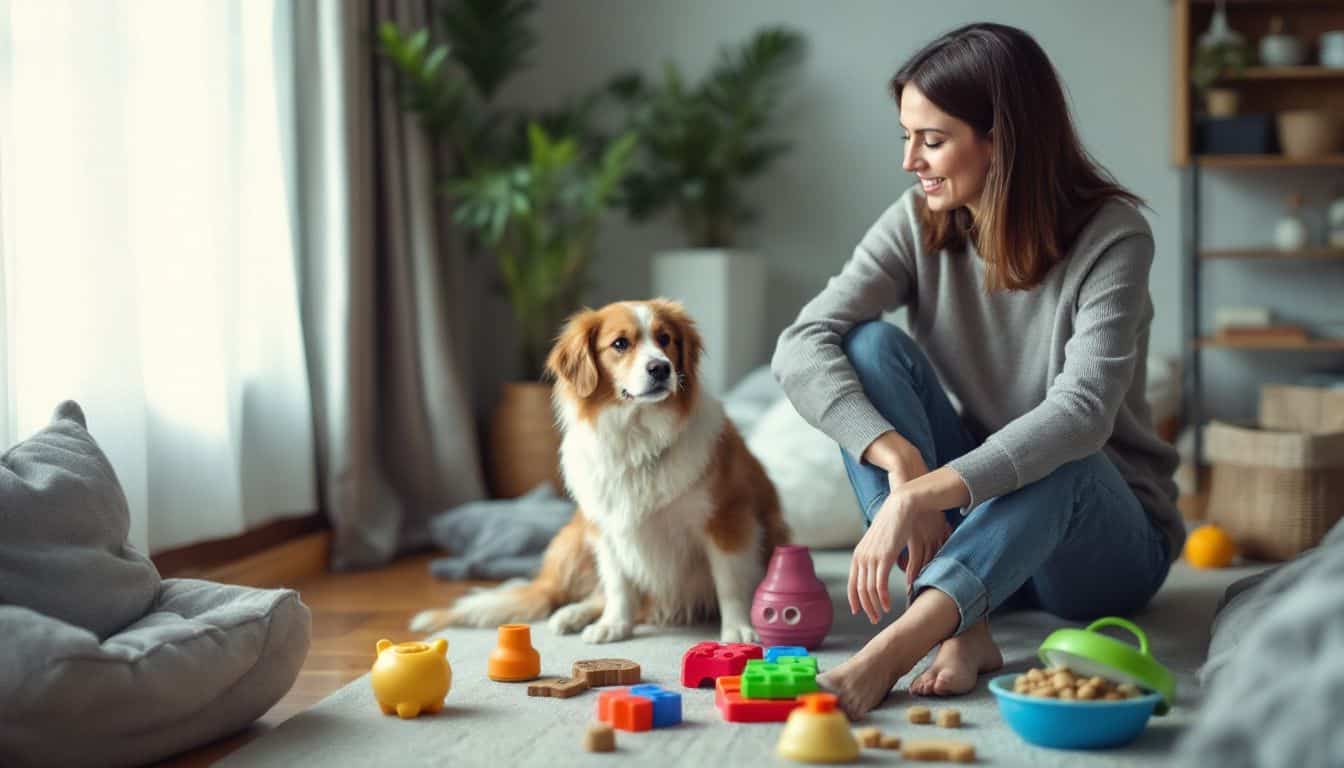
Dogs sometimes eat odd objects because of stress or anxiety. A nervous pup may chew and swallow things carrying your scent, especially if you’re gone often. This habit comforts dogs dealing with separation anxiety.
Another possible cause is pica—a condition leading dogs to eat non-food items driven by emotional troubles rather than hunger itself. Even boredom can lead pets to chew destructively, helping them burn off extra energy or draw attention.
Anxiety in dogs manifests in many ways, but eating foreign objects is one of the most dangerous coping mechanisms they develop, says Dr. Sarah Miller, veterinary behaviorist.
In homes with multiple pets, dogs may swallow random items to protect resources from others. Competition between animals makes some pups eat things out of fear they’ll lose them. Dealing directly with these emotional triggers works better than simply taking objects away.
Calming training exercises, puzzle toys, and daily exercise can help ease anxiety. For tougher situations, vets might recommend special training programs or even medication to help dogs relax and stop swallowing dangerous objects.
Nutritional deficiencies (Pica)
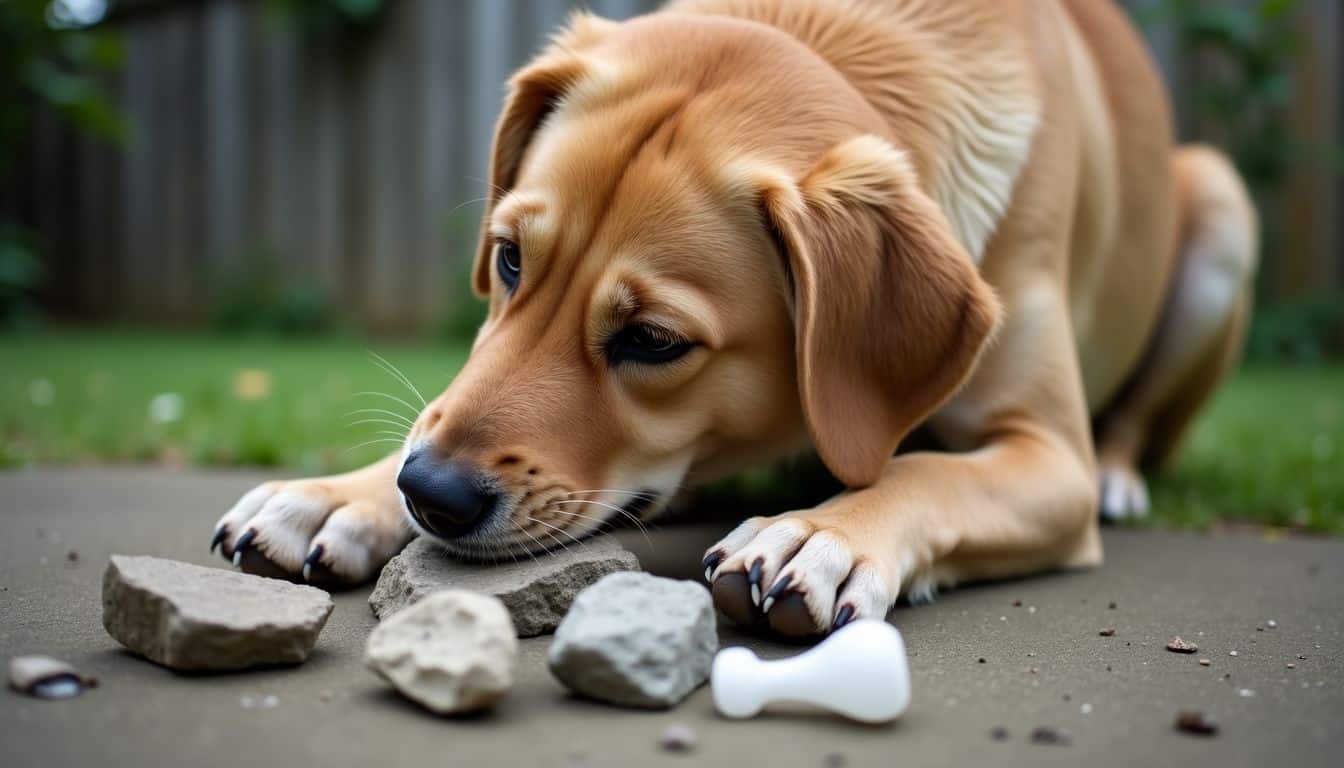
Some pups chew and swallow odd things because their diets lack certain nutrients. This odd behavior, known as pica, often hints at deeper health issues. Vets can usually pinpoint the cause through simple blood tests and a good physical check-up.
Your dog might begin eating dirt, rocks, or even bits of plastic if their body doesn’t get enough iron or zinc. Without these necessary minerals, the digestive system struggles, triggering odd cravings.
Many female dog owners notice this strange habit pop up suddenly, even in adult pets who never showed interest before.
Improving your dog’s diet, with better quality food or helpful supplements, typically clears up the problem. First though, your vet needs to figure out exactly what’s missing for your furry friend.
Risks of Dogs Eating Foreign Objects
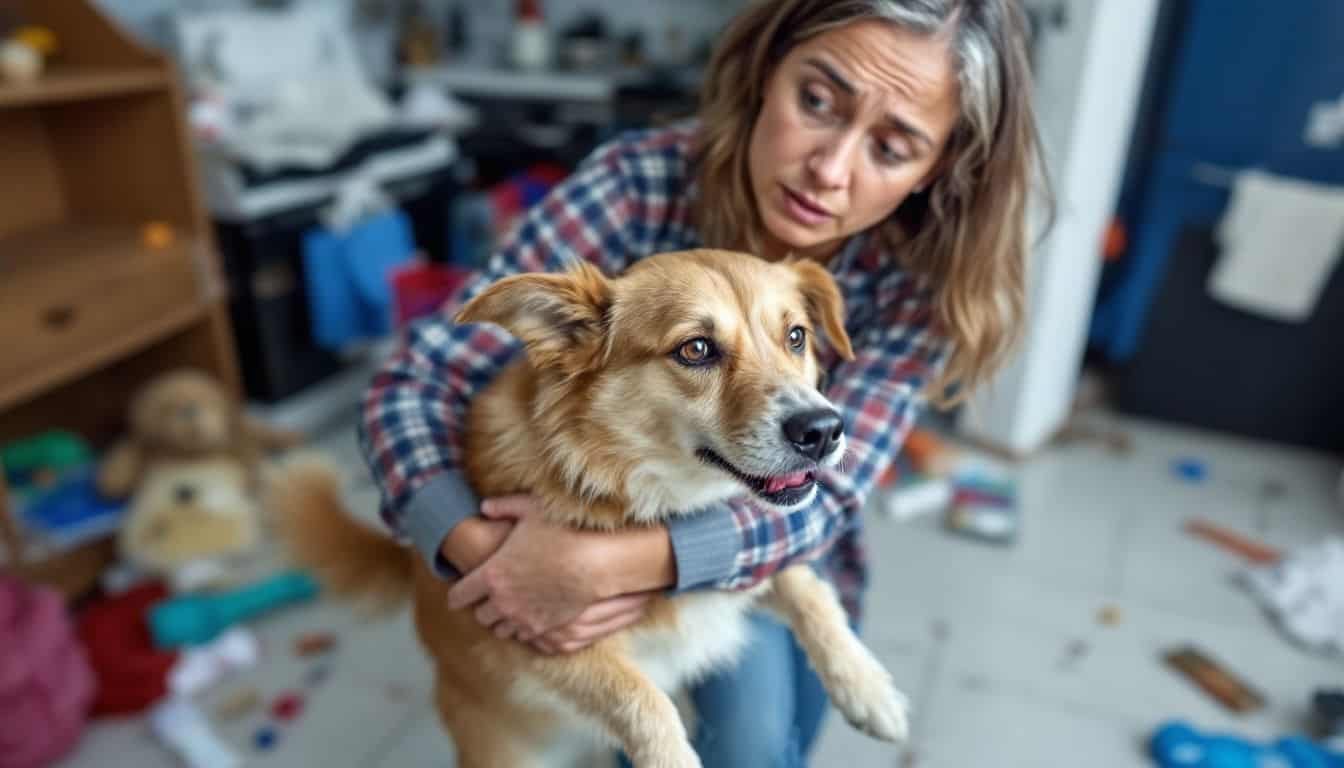
Dogs who eat foreign objects face serious health dangers that can lead to costly vet bills. Small items can block their windpipe or cause painful intestinal obstructions that may require surgical removal.
Choking hazards
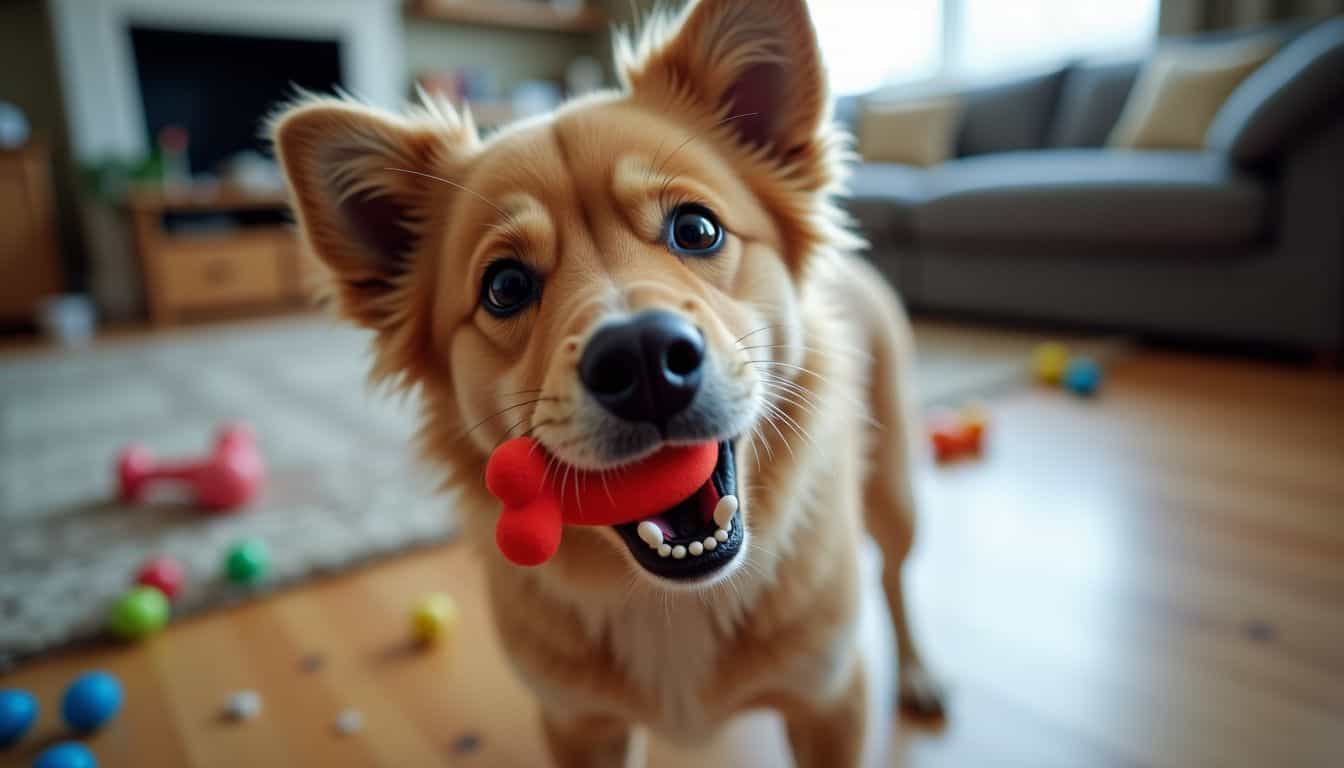
Your dog can face real danger by swallowing things they shouldn’t. Small items like toys, bones, and balls can get stuck in your pup’s throat, stopping airflow in just seconds. Once, my Labrador swallowed a rubber ball—I rushed her to the vet, and I still can’t forget her panicked gasps.
Breathing issues signal a life-threatening emergency, and it’s critical to act quickly. Your dog might paw at their mouth, gag, or develop bluish gums if their airway stays blocked.
The most dangerous moment is when you don’t see what they’ve grabbed – prevention saves more lives than reaction. – Dr. Sarah Miller, Emergency Veterinarian
Common choking hazards include tiny pet toys, dropped food scraps, and pills left loose around the house. Hard candy is especially risky, as it melts and sticks inside the throat. Small dog breeds face greater risk from choking since they have narrower airways than larger breeds.
So keep your space clean—stash medications safely away, pick up any clutter off the floors, and clear off low tables regularly.
Intestinal blockages
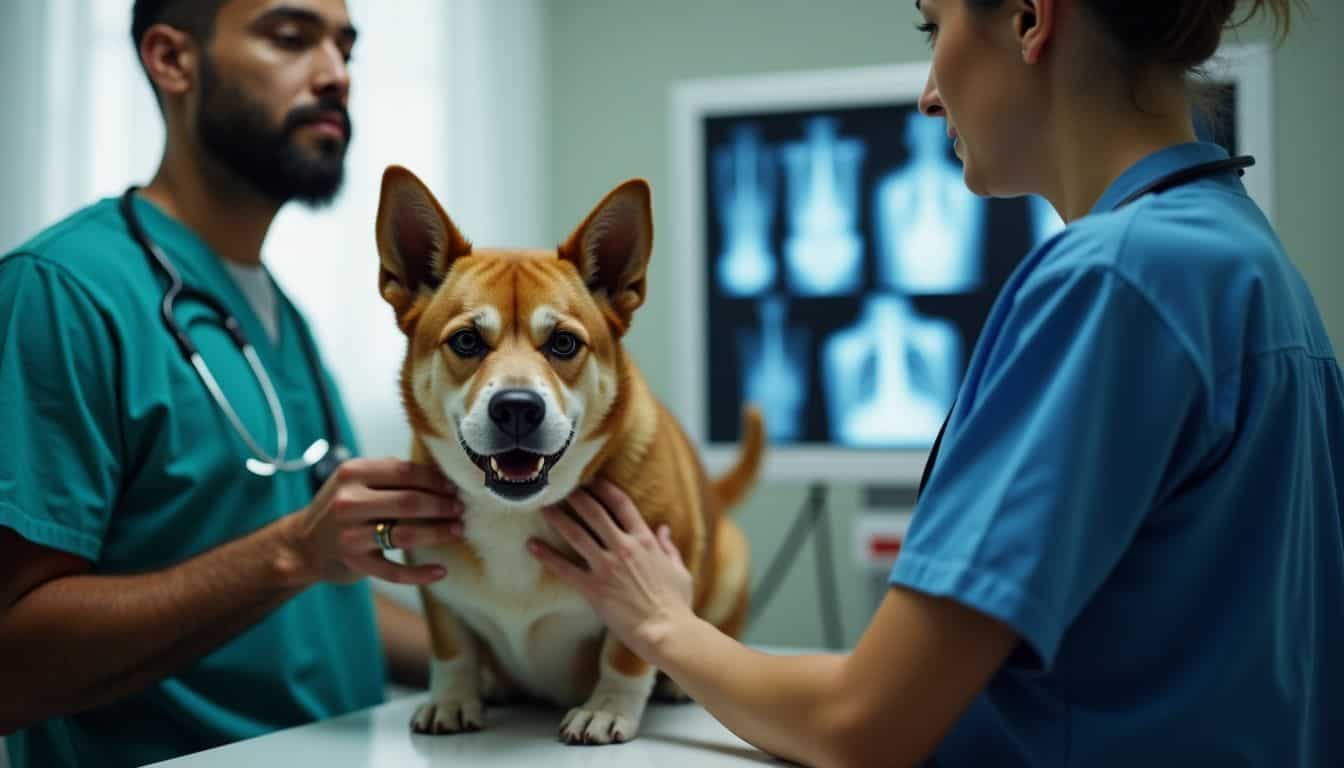
Intestinal blockages create serious risks for dogs who swallow odd objects. These obstructions occur when something gets trapped in a dog’s digestive system, blocking food and water from moving through.
Items might stick in the stomach, small intestine, or even lower in the colon, causing intestines to stretch and rip. Dogs with a blockage often show clear, easy-to-spot signs. Common symptoms include frequent vomiting, refusing their food, and clear abdominal pain.
The affected area can swell, making the dog’s belly look bloated—or even causing the pup to guard the painful area from anyone’s touch.
Vets typically use X-rays to quickly identify a blockage. In certain cases, surgery becomes necessary to take out the trapped object before serious damage occurs. Without proper care, blockages can cause severe issues such as peritonitis—a dangerous abdominal infection—or even tearing the intestinal wall.
Once blood flow is blocked for too long, parts of the intestine tissue may begin to die. Dogs can easily become dehydrated since nothing, even water, stays down. Dehydration can quickly cause electrolyte problems, throwing the dog’s entire system off balance.
Potential poisoning
Blockages aren’t the only threats dogs face—household items can easily become dangerous, too. Dogs often chew on cleaners, plants, and other toxic substances left lying around. These poisons quickly attack their organs.
My own dog grabbed a cleaning cloth once, and within just a few hours, he started vomiting and grew extremely weak. Common household items like certain flowers, leftover foods, and human medications can all harm your dog.
Signs of poisoning usually show up pretty clearly. Your dog might drool way more than usual, tremble, or struggle to walk normally. Some poisons trigger vomiting right away. Other toxins, though, quietly damage organs—like the liver or kidneys—over several hours or days.
After a terrifying trip to the vet with my pup, I learned my lesson about keeping cleaning products safely locked up. Sometimes even X-rays can’t detect poisons in dogs. Instead, vets often depend on bloodwork and details from you about what your dog possibly swallowed.
Signs Your Dog May Have Swallowed a Foreign Object
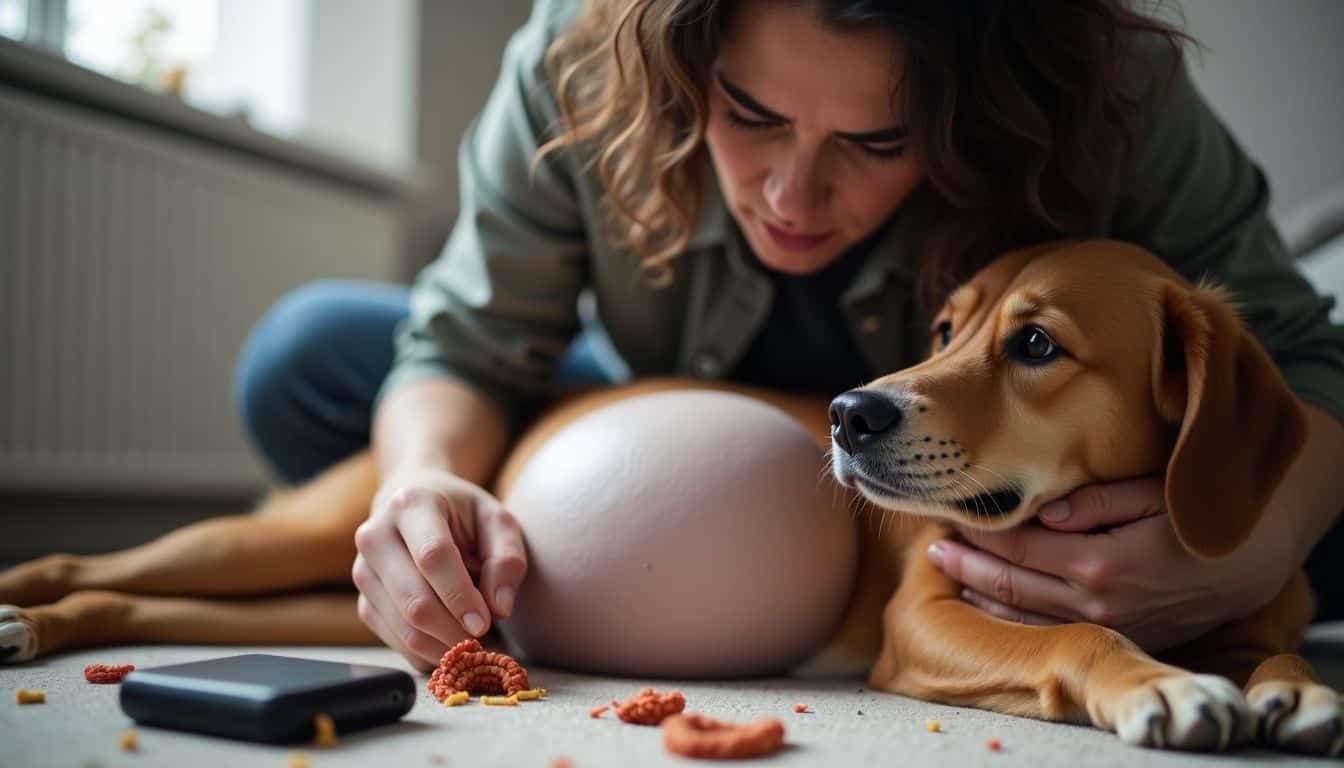
Your dog might show clear signs like vomiting, refusing to eat, or having a swollen belly if they’ve gulped down something they shouldn’t – watch for these warning signals and learn what to do next in our complete guide to keeping your furry friend safe.
Vomiting or gagging
Dogs often gag or vomit after swallowing items they shouldn’t. These symptoms are clear signals requiring immediate attention. If you notice your dog coughing or repeatedly throwing up, a foreign object could be stuck somewhere in the digestive system.
Their body naturally reacts by trying to get rid of the harmful item. Dogs might retch multiple times or make hacking sounds while attempting to expel the object.
A dog’s body has natural defense mechanisms – vomiting is often the first sign something is wrong.
Vets use X-rays to identify exactly where the object might be inside your dog’s stomach or intestines. Non-food items get trapped in the digestive tract because these areas can’t break them down.
Over time, this can lead to serious blockages or even tears in the stomach or intestines. If your pup shows any of these troubling signs, act quickly—call your vet immediately. Prompt care prevents severe health issues like intestine blockage or internal injury.
Even many of the [best breeds for family dogs](https://www.tidbitsofexperience.com/best-breeds-for-family-dog/) run into these problems, so keep an eye out for symptoms.
Lack of appetite
Vomiting often indicates trouble—and your dog may soon lose interest in food as well. A noticeable drop in appetite can signal that your pup has swallowed something harmful. Last summer, my retriever stopped running eagerly to her bowl after swallowing a sock.
Most dogs avoid their usual food or treats if something foreign irritates their stomach or intestines. A stuck object can cause pressure or pain in the digestive tract, making meals uncomfortable.
Your pup may sniff at food briefly, then walk away—or show interest but refuse to eat completely. This symptom rarely shows up alone; look closely for lethargy, bloating, or abdominal pain.
An intestinal blockage disrupts normal digestion, causing your dog to feel nauseous or overly full—even on an empty stomach. If your furry pal skips two meals in a row, it’s best to call the vet quickly for advice or an immediate x-ray.
Abdominal pain or bloating
Dogs that swallow foreign items usually show clear signs they’re feeling sick. Your dog might whimper, hunch oddly, or shy away if you try touching their belly. Gently pressing on your pup’s stomach might reveal hardness or swelling—both signs that something’s stuck inside and causing discomfort.
One time, my Lab mix kept pawing at her belly and wouldn’t even nibble at her favorite peanut butter treats; a quick vet check showed she’d gulped down a sock! If these objects linger too long in the gut, dogs can face serious issues like peritonitis (a painful belly infection) or sepsis, a life-threatening infection in the blood.
Your dog’s stomach might look bigger than usual, and they could rest in odd positions, desperately trying to ease their pain. Seeing these red flags means it’s the perfect moment to start learning how you can keep your furry friend from swallowing harmful stuff around the house.
How to Prevent Dogs from Eating Foreign Objects
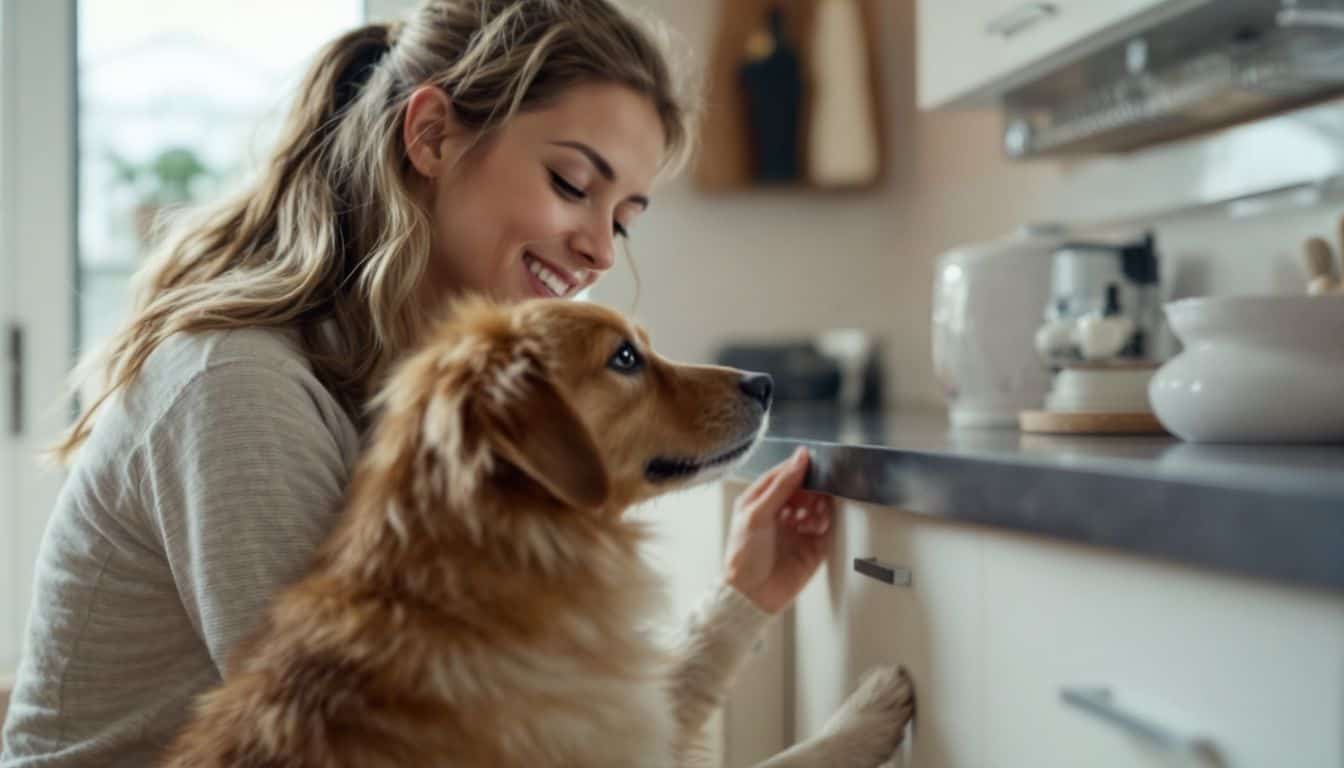
Keeping your dog from eating strange items needs smart fixes that work for your pet’s habits. You can stop this risky behavior with simple steps that protect your furry friend from stomach blockages and other health troubles.
Keep harmful objects out of reach
Dogs use their mouths to discover everything around them—that makes your home full of hidden dangers. I found this out the hard way after my Lab puppy gulped down a sock, leading to an emergency vet trip and surgery.
Keep garbage stored in sturdy bins with lids that seal tightly, blocking curious paws from exploring trash. Wipe up spills quickly, too, so your dog doesn’t lick up anything harmful that could lead to stomach trouble or poisoning.
Prevention is the most effective treatment for foreign body ingestion.
Small stuff—like buttons, coins, or children’s toys—needs to stay out of reach in drawers or on higher shelves. Also, secure loose cords, batteries, or TV remotes that dogs might find tasty for chewing.
Give special care to your laundry area; hang onto detergent pods in locked cabinets, and toss dirty clothes straight into hampers with secure lids. Dogs often develop favorites for chewing on certain items, so notice and keep track of what attracts your pup the most.
Teach simple commands such as “leave it”, giving another helpful way to protect your dog from swallowing dangerous things around your house.
Provide adequate toys and mental stimulation
Your furry friend needs the right toys to avoid chewing random things around your home. Interactive toys help occupy their minds, reducing boredom and satisfying their natural desire to chew.
Puzzle feeders encourage your pup to work for tasty treats, while durable rubber toys usually outlast cloth options. Choosing safe chew toys that fit your dog’s size and chewing habits helps prevent them from swallowing harmful objects.
Pet stores usually offer plenty of options, so you can find something that matches your dog’s personality and habits perfectly.
Mental stimulation also helps curb unwanted chewing habits. You can hide snacks around your home or teach your pup fun new tricks to keep their brain active. Regular physical play burns excess energy that often leads to destructive chewing behaviors.
After all, a tired pup has less motivation to chew on random household objects. Try switching out their toys every week or so—this keeps playtime exciting and helps curious dogs stay interested.
This simple step goes a long way for pups who easily lose interest in their toys.
Use deterrent sprays for certain items
Bitter sprays give you an easy solution for dogs that can’t stop chewing forbidden items. These products taste awful to pets—but they’re safe and harmless. Many vets recommend spraying bitter solutions on spots dogs love to chew, like furniture corners, electrical wires, shoes, or bags.
The terrible taste quickly teaches your pup to associate that object with a nasty experience. Soon, most dogs start leaving treated items alone, reducing their risk of swallowing something dangerous.
Chewed-up household items can lead to blockages in a dog’s gut and even surgery—an expensive, stressful experience for everyone.
For the best outcome, spray the bitter solution daily until the dog completely loses interest in the targeted object. If one flavor doesn’t discourage chewing, try switching to a different brand or stronger formula.
Pair the spray treatment with simple training commands like “leave it”, to increase the odds of success. Combining bitter sprays with basic obedience training makes correcting the chewing behavior faster and easier.
Train “leave it” and “drop it” commands
Deterrent sprays may taste bad, but solid command training delivers more protection long-term. Teaching your dog simple cues like “leave it” and “drop it” helps shield them from harmful objects or substances.
These commands create verbal boundaries, keeping your pet safe from risky items.
To teach “leave it”, hold a tasty treat in your closed fist and calmly say “leave it”. Wait patiently until your dog steps back, then quickly reward their decision. For “drop it”, try a simple exchange—offer your dog a yummy snack, the moment they let go of a toy.
Practice consistently, using different objects and practicing both indoors and outdoors. Soon your dog learns that listening brings rewards even better than whatever they’re curious about.
Regular training reduces risks like foreign object obstructions or accidental poisoning. In fact, most vets agree these commands are your best defense against dangerous items. On top of keeping their stomach healthy, this practice also strengthens the connection between you and your furry friend.
When to Seek Veterinary Help

Head straight to your vet if your dog shows signs of eating something harmful. My pup once ate a sock and began to vomit repeatedly—I didn’t risk waiting to see if it would pass on its own.
A vet will typically use X-rays to check your dog’s stomach and intestines for foreign objects. They might also recommend an endoscopic procedure to safely remove the item or check for potential damage to the gut lining.
In severe cases, surgery could become necessary, especially if the object blocks the digestive tract.
If your dog swallows harmful substances—like pesticides or dangerous foods—call poison control immediately. Keep an eye out for common red flags such as refusing food, belly pain, or diarrhea.
Your vet is likely to perform a thorough physical exam and may request abdominal X-rays to understand what’s happening internally. Dogs that become lethargic or weak need medical care right away, as issues can quickly lead to dehydration, electrolyte issues, or even a tear in the intestines.
Follow your gut feeling—you understand your pup better than anyone does.
Tips for Managing Dogs Prone to Eating Foreign Objects
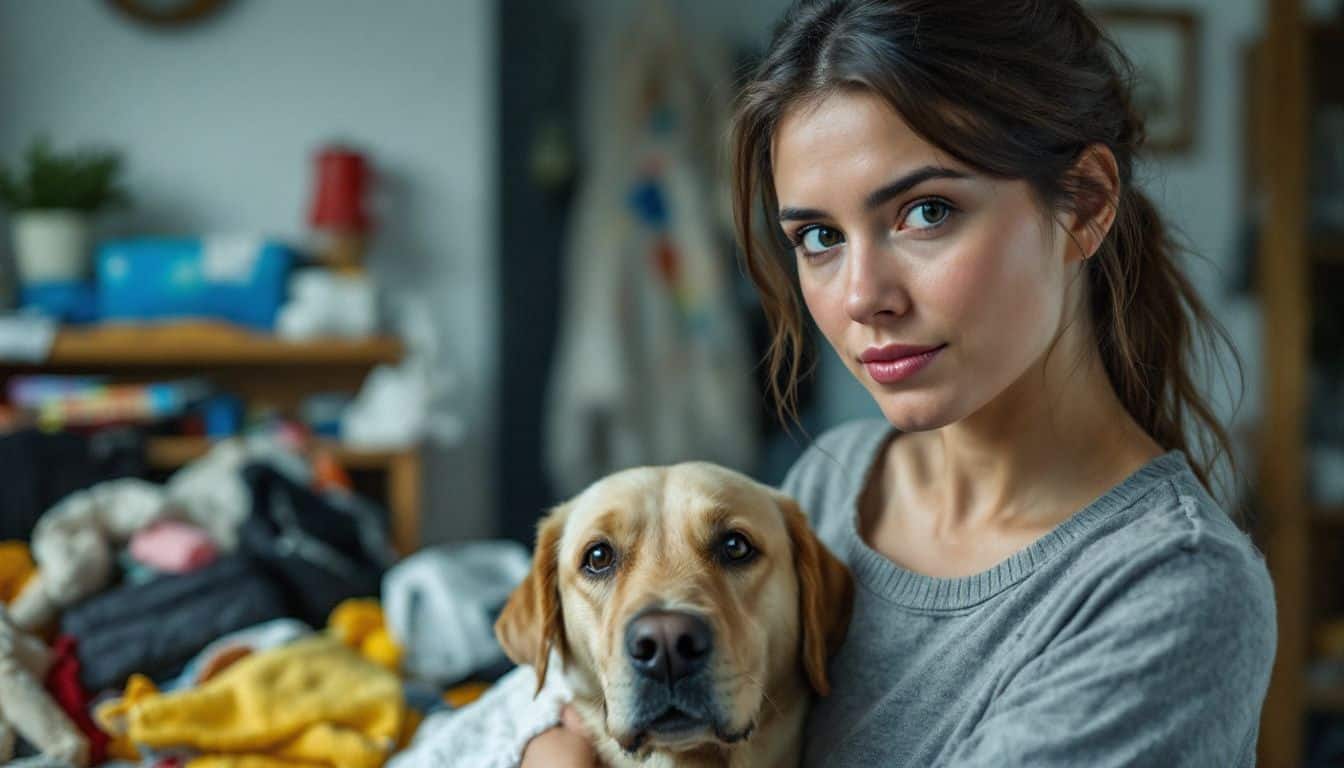
Dogs with a habit of munching on strange items need special care beyond basic training. You can find smart ways to manage these curious pups while keeping them safe from harmful objects.
Supervise outdoor activities
Your furry pal explores the world through their mouth—especially during walks. In spots filled with trash or debris, I keep my Lab on a short leash. Parks are tricky too; other pets leave behind toys and waste your dog might snatch up.
A brief glance at your phone offers enough time for your pup to gulp something harmful. Teaching a solid “leave it” command has helped me protect my dog from swallowing risky objects more times than I’d like to count.
According to many vets, most pet emergencies from swallowed items happen outdoors without supervision. Try choosing walking paths with fewer tempting scraps lying around. And for dogs that tend to eat odd things, a basket muzzle can give you extra peace of mind.
Using a muzzle during walks might feel harsh at first, but it can save your friend from expensive vet visits and painful x-ray procedures. To ensure comfort, make sure the muzzle fits correctly, letting your pup pant normally and drink easily.
Introduce it slowly, with short sessions at first, to help your dog get used to wearing it. My neighbor had a terrier who needed surgery after gulping rocks in the park—a simple muzzle would have easily stopped that dangerous blockage.
Foreign objects stuck along your pet’s digestive system can cause severe harm and lasting damage.
Use a muzzle during walks if needed
Keeping an eye on your dog during outdoor strolls is helpful—but some dogs just can’t resist snatching things off the ground. For pups who scavenge nonstop, basket muzzles provide a gentle solution.
Unlike tight-fitting muzzles that limit breathing and drinking, basket types let dogs comfortably pant, sip water, and accept treats from your hand. I tried one with my Labrador, who constantly grabbed trash during walks—and it made our outings so much easier.
Always steer clear of tight muzzles because they can prevent proper breathing or drinking. A basket muzzle allows dogs freedom and comfort, while still keeping them from picking up dangerous items.
By using one of these simple tools, you can lower the chance of your dog swallowing harmful objects that might lead to surgery. You can find well-fitting basket muzzles at most pet stores.
With some gentle practice, most pups get used to wearing one in no time. The relief you’ll feel during walks makes the short adjustment period totally worthwhile.
Address underlying behavioral issues
Dogs sometimes chew on weird items because they’re bored, anxious, or stressed. This habit can get dangerous quickly, so you’ll want to act right away. Try to figure out what’s causing your dog’s urge to snack on non-food stuff—does it usually occur while you’re out, or maybe during loud storms?
Regular exercise can truly make a difference for dogs bursting with energy. A pup who’s tired is far less likely to chew on random objects. Daily walks, playful games like fetch, and agility exercises can burn off excess energy and keep dogs calm.
Mental activities matter too—physical exercise alone is not enough. Puzzle toys, short training sessions, and teaching new tricks can occupy your dog’s mind, helping to prevent boredom.
Some anxious dogs calm down with aids like thunder shirts or pheromone sprays. In severe cases, speak to your vet to rule out metabolic issues or other hidden health problems. Sudden changes in eating behaviors can indicate medical concerns that need swift attention.
Next up, we’ll talk about signs that your dog needs vet care after swallowing foreign items.
How Will Foreign Object Ingestion in Dogs Evolve in 2025?
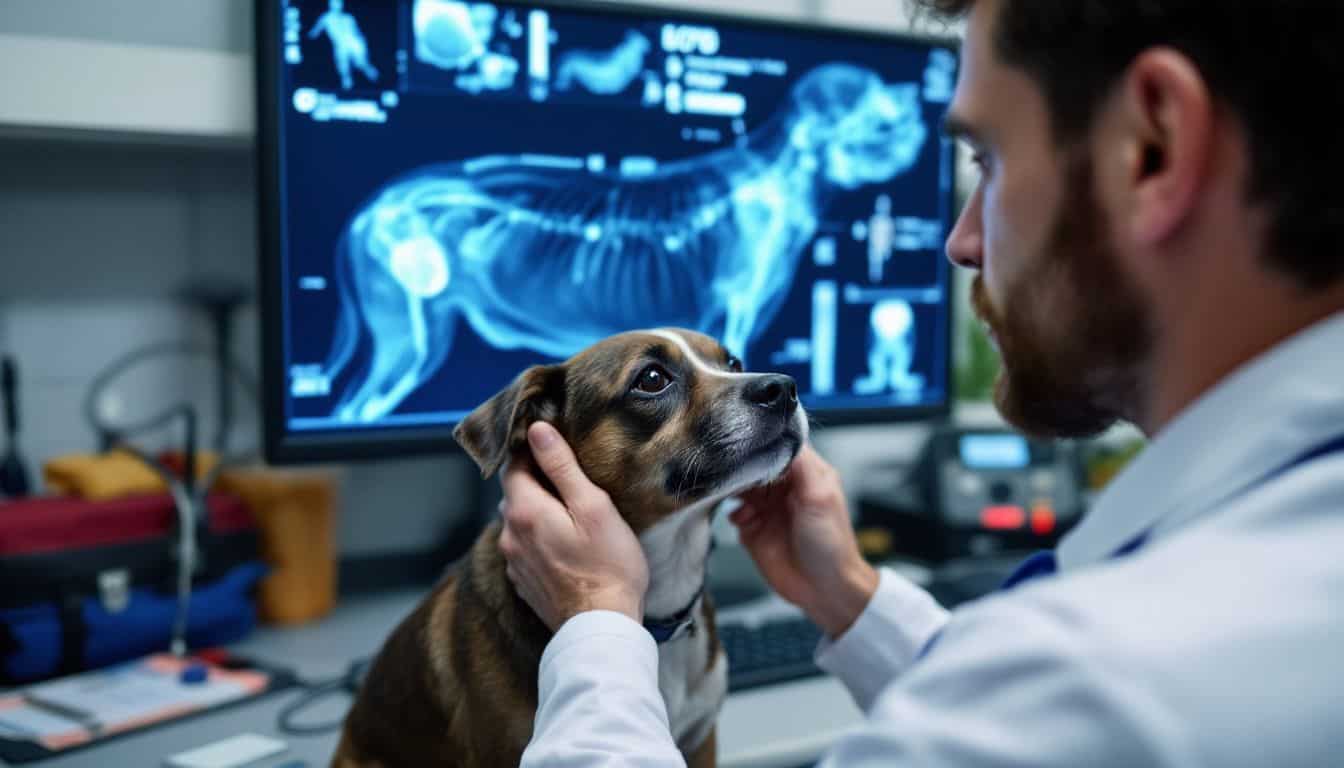
Veterinary treatments for foreign body blockages will look very different by 2025. New, advanced X-ray tools will quickly find items lodged inside your pet’s digestive system—saving valuable minutes during an emergency.
Vets will also perform endoscopic exams using tiny cameras, allowing them to carefully remove swallowed objects without open surgery. Your furry friend will heal quicker, face fewer risks, and your vet bills will shrink as well.
Many animal hospitals will even stock specialized emergency kits containing tools designed specifically for safely retrieving common swallowed items—like stray socks or chewed-up toy fragments—from your dog’s stomach.
Preventing these hazards will soon become simpler and smarter. Pet stores will stock toys that dissolve harmlessly if eaten by mistake. You’ll find special food bowls designed to slow pets who wolf down their meals—helping stop them from accidentally gulping harmful objects.
Helpful apps will monitor your furry pal’s behavior, alerting you if they start chewing or swallowing inappropriate items, a habit known as pica. After all, certain dogs are better than people at finding mischief—which makes technology like this especially useful! You might even see home-testing kits on store shelves, helping you easily check your pet’s stool at home for early warning signs.
By 2025, these innovations will make life much simpler—and safer—for pet owners everywhere.
FAQs
1. Why do dogs eat foreign objects?
Dogs may eat weird objects out of boredom, hunger, or an underlying health problem like Addison’s disease. Some dogs develop a condition called coprophagia—eating stools—or have digestive troubles that cause cravings for non-food items.
2. What are signs my dog ate something bad?
Watch for vomiting, difficulty pooping, or a sore stomach area. Your dog might refuse their meals, act tired, or even show signs of shock. These symptoms often indicate a blockage somewhere in the digestive system.
3. How do vets find foreign bodies in dogs?
The vet might perform tests like x-rays, endoscopy, or examine stool samples. Urine tests and thorough check-ups are also common. If necessary, the vet can use a tiny camera (endoscopy) or perform a surgical procedure called a laparotomy to see what’s inside clearly.
4. Can foreign objects in dogs heal without surgery?
Small items sometimes pass on their own through the digestive tract. Vets might first use IV fluids to hydrate your dog before considering surgery. But larger or string-like items usually need to come out quickly to avoid injury inside the gut.
5. What happens if foreign objects aren’t removed?
Objects stuck in your dog’s body can cause dangerous injuries like gut tears, painful ulcers, or severe inflammation (gastroenteritis). Aspiration pneumonia (lung infections from breathing in vomit) and electrolyte imbalances could also happen—leading to critical, even life-threatening, situations.
6. How can I stop my dog from eating non-food items?
Keep your home free of small objects and hazards that catch your dog’s attention. Provide a nutritious diet with quality meats and helpful supplements like probiotics to boost gut health. Train your dog using commands like “leave it”, and offer plenty of safe, engaging toys.
References
- https://thelightofdog.com/stop-your-dog-from-eating-rocks-socks-and-other-non-food-items/ (2019-04-29)
- https://www.akc.org/expert-advice/health/pica-in-dogs/ (2024-02-29)
- https://www.petmd.com/dog/emergency/common-emergencies/e_dg_swallowed_objects (2023-06-26)
- https://www.petmd.com/dog/conditions/digestive/dog-intestinal-blockage-signs-and-what-to-do (2025-03-30)
- https://vcahospitals.com/know-your-pet/ingestion-of-foreign-bodies-in-dogs
- https://northalabamadogtrainers.com/the-dangers-of-foreign-object-ingestion-in-dogs-prevention-awareness-and-training/
- https://amyshojai.com/swallowed-objects/ (2024-04-23)
- https://www.abc.net.au/news/2017-04-12/pica-why-dogs-eat-foreign-objects-and-what-you-can-do/8433730 (2017-04-12)
- https://vcacanada.com/know-your-pet/foreign-bodies-in-dogs
- https://www.boredpanda.com/dog-eating-toys/
- https://www.youtube.com/watch?v=tTq-LsllwsA
- https://www.kinship.com/dog-behavior/how-stop-your-dogs-scavenging
- https://www.whole-dog-journal.com/food/how-to-keep-a-dog-from-eating-everything-he-sees/ (2023-04-21)
- https://www.vetwest.com.au/pet-library/foreign-body-ingestion-in-dogs/
